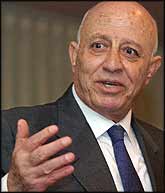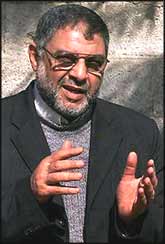Azmi Bishara
Because of political and media hype the public expected the meetings of Palestinian factions in Cairo to produce a ceasefire. Headlines were already taking imaginary shape. Only the details needed to be worked out: would the ceasefire be unilateral or bilateral; and would it be within the green line, confined to civilians, or more comprehensive in nature?
Had the dialogue been about a genuine ceasefire it should have been between the Palestinians and the Israeli government and have broached such matters as the timeframe and international monitoring. This is what happens in ceasefire talks. The ceasefire lines of 1949 did not turn into a truce agreement until after the Rhodes negotiations. The ceasefire between Israel, on one hand, and Egypt and Syria on the other did not turn into a fact until after the 1973 war. The 1967 war did not end in ceasefire lines, but in a war of attrition.

So long as Israel is not a partner in the “dialogue” over the ceasefire such a ceasefire has no chance of holding. No one is negotiating with Israel over a ceasefire: the latter does not want one and is boasting of the fact. This boasting has not, however, stopped Israel from commenting on the outcome of the Cairo talks or from linking the failure of the dialogue with the building of the apartheid wall.
But semantics and Israel’s intentions aside, the Palestinians must agree on the best methods of struggle and ditch the less suitable. And this effort will not be successful until the Palestinians change both the goals and motives of their dialogue, along with the resulting expectations.
What is the logical and realistic goal of dialogue in the current phase?
The Palestinians cannot hope for a just solution of their cause anytime soon. Sharon knows that. This is why he is calling on the Palestinians to accept a long-term transitional settlement while threatening them with unilateral moves, including the wall. Both Sharon and his deputy, Ehud Olmert, are in favour of unilateral action towards the Palestinians.
Since an acceptable settlement cannot be expected under Sharon the Palestinians should focus on consolidating and maintaining national unity. They need to agree on the interim objectives of the national Palestinian struggle; on the methods, pace and orientation of the struggle; on the way to provide the Palestinian people with a better economy, education, and healthcare so that the latter may hold out against anything less than a fair settlement and on a democratic political discourse that would make sense to the US, Israeli and world public opinion.
To achieve these goals the Palestinians need a unified national command. This command should encompass the PLO as well as other factions. Better still, the other factions should join the PLO. Barring this possibility an appropriate framework for cooperation must be created. The unified command would not substitute PA institutions, unless the latter are dissolved. The dissolution of the PA, however, is hardly a realistic option. The PA is hardly going to dissolve itself and the alternative may be the emergence of local militias with or without links to Israel, which could easily benefit from the resulting chaos.
A unified national command is the Palestinians’ only hope of controlling the pace and methods of struggle, and the Palestinians can form such a command without waiting for Israel to countenance a ceasefire. Such a command should do what it deems useful to the Palestinian struggle without having to deal with deadlines. It may opt for a discontinuation of all or some forms of armed action for sometime, or not. What matters is that the command’s decisions be collective and not subject to reneging or one-upmanship. The unified command would be in a position to penalise those who breach the decisions they helped reach.
Those who think that the peace option exists and that the Palestinians are divided into two camps, one for peace and another for war, are not only deluded, they are actively courting civil war, a prospect that a nation living under occupation and crammed in refugee camps cannot afford.

The aim of the dialogue should be to consolidate national unity, even if in a gradual manner, and formulate the frameworks and the institutions unity requires. Dialogue is not an end in itself, nor is it a tactical move. Dialogue is not something in which people engage whenever one faction is in trouble or another has an urge to negotiate.
The aim of the dialogue is not to bring about sufficient calm for those wishing to negotiate with Israel and America to pursue those ends, or for the Palestinian leadership to look good for negotiating purposes. Perceived as such, dialogue only undermines the confidence of those who daily face Israel’s aggression and who are continual targets for its assassinations. One cannot conduct a dialogue in Arabic with national Palestinian factions, while accusing them in English of terror.
The dialogue should not go down the road opposite to that along which it should be heading. It should neither facilitate the elimination of one of its parties, nor distract us from the overdue assessment of the methods of struggle. One should not jettison the assessment of the means of struggle, or the struggle itself, just because the situation is hard or because we need to say that the dialogue was a success. Such an attitude is harmful to Palestinian national interests.
Without the creation of a unified national command any talk of a unified strategy is in vain. The Palestinians have to prioritise their goals and rally their resources for the major battles ahead, chiefly over the apartheid wall. The wall is the worst thing that can happen to the Palestinians, worse even than the dismemberment of Jerusalem. This wall has to be confronted through national unity, and the latter is hard to achieve while civilians are being targeted, regardless of whether Israel agrees or not to “neutralise civilians” in the current conflict.
Some think of the wall as a political boundary running close to the green line. In reality the wall gives Israel the chance to extend its unilateral political borders eastward under security pretences. The unilateral borders suggested by Sharon and Olmert are worse than the wall itself. By the same token, Israel may later build an eastern wall running along the Jordan valley—just one example of the racist unilateral measures lying in store.
Some are encouraged by the recent proliferation of peace initiatives, including that of Deputy Prime Minister Ehud Olmert. But Olmert’s proposals [to withdraw Israel?s troops to a line containing most of the settlements inside the West Bank] are the antithesis of a peace initiative. Olmert’s main premise is that peace initiatives are futile, a negotiated agreement is out of reach, and therefore Israel must take unilateral measures. Dialogue and Palestinian national unity are in essence unilateral steps, needed to counter those of Israel.
Article courtesy of Al-Ahram Weekly